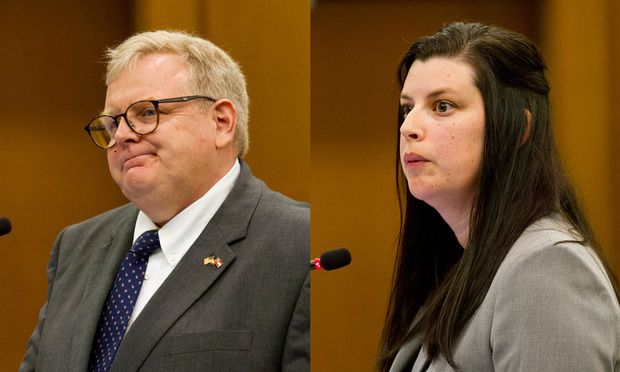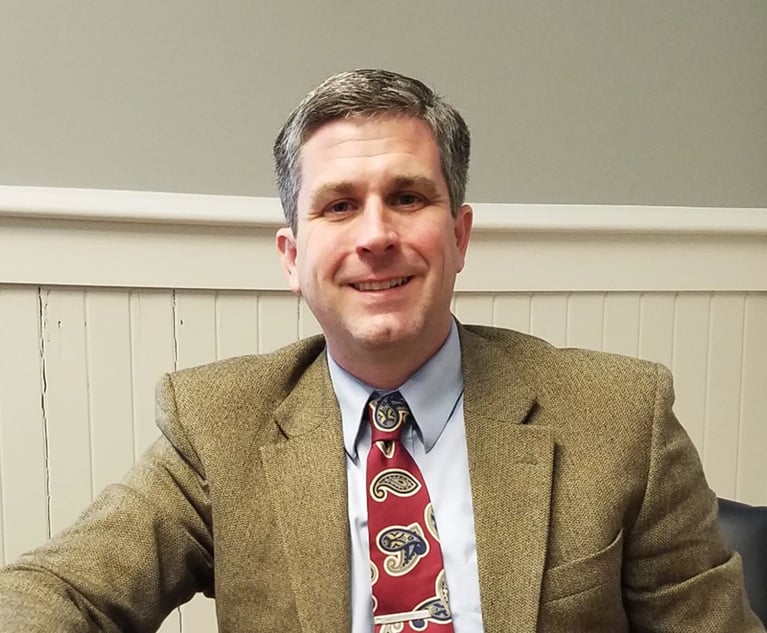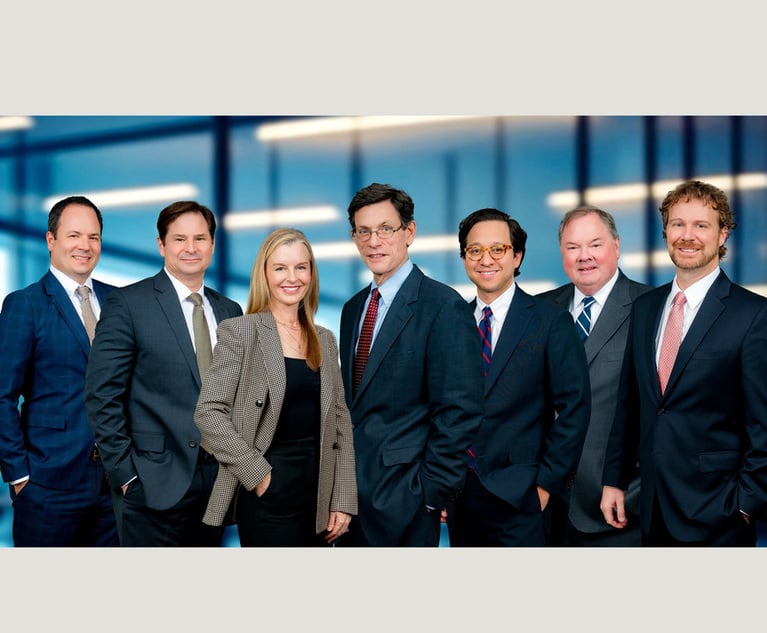State High Court Continues to Wrestle With '13th Juror' Issue
During the argument, the justices discussed a hypothetical gun assault against the bench, skepticism for the prosecutor's position and legal issues going back more than 200 years.
November 08, 2019 at 11:05 AM
6 minute read
 Thomas Bishop, Pataula Circuit District Attorney's Office (left), and Christina Cribbs, Georgia Public Defender Council. (Photos:: John Disney/ALM)
Thomas Bishop, Pataula Circuit District Attorney's Office (left), and Christina Cribbs, Georgia Public Defender Council. (Photos:: John Disney/ALM)
Justices of the Supreme Court of Georgia heard cases before bare walls this week, as portraits of their predecessors are being transferred to the state's new judicial center a few blocks away. Along with the paintings, the court is expected to bring to its new digs a debate with prosecutors over trial judges' powers to overturn a jury verdict in exceptional cases.
Last month, seven of nine justices warned prosecutors that appealing judges' "13th juror" decisions based on their assessment of evidence and testimony credibility, have "no realistic chance to prevail" and would only waste everyone's time and resources.
On Tuesday, the court heard arguments in another "13th juror case," and the justices discussed a hypothetical gun assault against the bench, skepticism for the prosecutor's position and legal issues going back more than 200 years.
The case dealt with Jason Wilkerson, who was convicted in 2014 of 10 counts of aggravated assault stemming from a gun-wielding confrontation of his sister, her boyfriend and their three toddlers. A key part of this matter depends on a federal precedent and two state laws. A 1979 U.S. Supreme Court decision says judges may order new criminal trials when they find there was not sufficient evidence by which a rational jury could have found proof of guilt beyond a reasonable doubt. The Georgia laws allow judges to overturn jury verdicts they find "contrary to evidence and the principles of justice and equity."
In 2017, Judge Thomas Baxley of Early County Superior Court, who took over the Wilkerson case from the jurist who presided over the trial, tossed three of the aggravated assault convictions. Citing both the U.S. Supreme Court ruling and the state laws, Baxley concluded that the children were not aware that a gun was being pointed at them and didn't feel threatened, so Wilkerson didn't assault them.
Baxley wrote—in language that would be parsed to individual punctuation marks by higher courts—that the convictions "are strongly against the weight of the evidence, are contrary to the evidence and the principles of equity and justice, and there was not sufficient evidence to allow a rational trier of fact to find [Wilkerson] guilty of these Counts." He cited the state laws, O.C.G.A. §§ 5-5-20 and 21, and the precedent, Jackson v. Virginia, 443 U.S. 307 (1979).
Prosecutors appealed, and last year a panel of the Court of Appeals reversed Baxley on his assessment, based on the U.S. Supreme Court ruling, that the evidence wasn't sufficient.
Judge Trent Brown, writing with the concurrence of Presiding Judge Yvette Miller and Judge Stephen Goss, then vacated the part of Baxley's ruling based on the state laws. They rejected Wilkerson's argument that the prosecutors had failed to enumerate as error the court's handling of that issue. "On the contrary," Brown wrote, "given the wording of this portion of the trial court's order, we find that the State implicitly challenges this ruling in its claim that the trial court erred in finding the evidence insufficient to sustain the three convictions."
Brown added later that the panel was "unable to determine which standard the trial court applied to its ruling under the general grounds," referring to the state law allowing a judge to act as the "13th juror." The panel sent the case back to the trial judge and said he should reconsider that issue under the "correct legal standard."
Wilkerson's lawyers from the Georgia Public Defender Council appealed to the Supreme Court. It said it would review only whether the appeals court panel made a mistake on vacating and remanding the part of Baxley's decision concerning the state law.
At oral argument, Christina Cribbs, representing Wilkerson, said, "I don't think it's reasonable the judge got confused."
She said the trial judge "wasn't ambiguous" about his standards. She noted how he cited the precedent and the Georgia statutes in one part of the decision in which he upheld some of the convictions, and then—in the sentence overturning the three convictions at issue—he cited both of them.
Noting the Supreme Court's decision last month upholding another judge's "13th juror" decision to grant a new trial, Cribbs added, "Even if the state had appealed on this ground, it was highly unlikely it would prevail."
The justices mostly listened to Cribbs, but they took a more active role when Thomas S. Bishop, an assistant district attorney from Cuthbert, rose to argue.
"Look closely at the facts of the case," he urged the justices at the beginning.
Justice Sarah H. Warren interrupted that the issue before the court was "a legal question," not factual: Did the Court of Appeals err in sending the case back to the trial court judge to reconsider his ruling on overturning the verdict on the "general grounds" provided by the state statutes.
When Bishop referred to the judge's power as "a rule," Warren stopped him to make sure he was aware that power came from a statute passed by the General Assembly.
"I understand there is such a law," Bishop said.
Presiding Justice David Namias broke in several times to ask how the law applied to several hypothetical situations. In one, an attacker is in the courtroom, and Nahmias dives under the bench while another justice yells, "He's got a gun!" Would the attacker be guilty of assaulting Nahmias?
Later, after Bishop said Wilkerson's pointing a gun at a car in which the parents and their children were riding amounted to assaulting everyone in the car, Nahmias again explored his imagination. What if the car was a stretch limousine? What if it was a house—would someone pointing a gun at house assault everyone in the house?
Bishop replied that he'd recently seen a grand jury agree with that proposal.
A former federal prosecutor, Nahmias said through chuckling, "I used to present a lot of stuff to grand juries."
Justice Nels Peterson said it was very clear the judge understood the state laws and the precedent surrounding overturning a jury verdict, but he suggested the standard the judge used to consider the state laws could open to more scrutiny.
Justice Charlie Bethel asked what is the scope of a judge's authority to overturn a verdict on the general grounds, that is, via the state laws.
"It's unfettered discretion, and I don't believe that's right," Bishop said.
Bethel later noted that the "13th juror" power of judges dates back to at least 1799 and that the General Assembly had passed laws specifically to stop courts from "messing" with that power.
"Why would we not follow that precedent and say this is a power trial judges have?" he asked.
"Because they got it wrong," Bishop said.
This content has been archived. It is available through our partners, LexisNexis® and Bloomberg Law.
To view this content, please continue to their sites.
Not a Lexis Subscriber?
Subscribe Now
Not a Bloomberg Law Subscriber?
Subscribe Now
NOT FOR REPRINT
© 2025 ALM Global, LLC, All Rights Reserved. Request academic re-use from www.copyright.com. All other uses, submit a request to [email protected]. For more information visit Asset & Logo Licensing.
You Might Like
View All
On The Move: Squire Patton Boggs, Akerman Among Four Firms Adding Atlanta Partners
7 minute read

Justice 'Weaponization Working Group' Will Examine Officials Who Investigated Trump, US AG Bondi Says

Trending Stories
Who Got The Work
J. Brugh Lower of Gibbons has entered an appearance for industrial equipment supplier Devco Corporation in a pending trademark infringement lawsuit. The suit, accusing the defendant of selling knock-off Graco products, was filed Dec. 18 in New Jersey District Court by Rivkin Radler on behalf of Graco Inc. and Graco Minnesota. The case, assigned to U.S. District Judge Zahid N. Quraishi, is 3:24-cv-11294, Graco Inc. et al v. Devco Corporation.
Who Got The Work
Rebecca Maller-Stein and Kent A. Yalowitz of Arnold & Porter Kaye Scholer have entered their appearances for Hanaco Venture Capital and its executives, Lior Prosor and David Frankel, in a pending securities lawsuit. The action, filed on Dec. 24 in New York Southern District Court by Zell, Aron & Co. on behalf of Goldeneye Advisors, accuses the defendants of negligently and fraudulently managing the plaintiff's $1 million investment. The case, assigned to U.S. District Judge Vernon S. Broderick, is 1:24-cv-09918, Goldeneye Advisors, LLC v. Hanaco Venture Capital, Ltd. et al.
Who Got The Work
Attorneys from A&O Shearman has stepped in as defense counsel for Toronto-Dominion Bank and other defendants in a pending securities class action. The suit, filed Dec. 11 in New York Southern District Court by Bleichmar Fonti & Auld, accuses the defendants of concealing the bank's 'pervasive' deficiencies in regards to its compliance with the Bank Secrecy Act and the quality of its anti-money laundering controls. The case, assigned to U.S. District Judge Arun Subramanian, is 1:24-cv-09445, Gonzalez v. The Toronto-Dominion Bank et al.
Who Got The Work
Crown Castle International, a Pennsylvania company providing shared communications infrastructure, has turned to Luke D. Wolf of Gordon Rees Scully Mansukhani to fend off a pending breach-of-contract lawsuit. The court action, filed Nov. 25 in Michigan Eastern District Court by Hooper Hathaway PC on behalf of The Town Residences LLC, accuses Crown Castle of failing to transfer approximately $30,000 in utility payments from T-Mobile in breach of a roof-top lease and assignment agreement. The case, assigned to U.S. District Judge Susan K. Declercq, is 2:24-cv-13131, The Town Residences LLC v. T-Mobile US, Inc. et al.
Who Got The Work
Wilfred P. Coronato and Daniel M. Schwartz of McCarter & English have stepped in as defense counsel to Electrolux Home Products Inc. in a pending product liability lawsuit. The court action, filed Nov. 26 in New York Eastern District Court by Poulos Lopiccolo PC and Nagel Rice LLP on behalf of David Stern, alleges that the defendant's refrigerators’ drawers and shelving repeatedly break and fall apart within months after purchase. The case, assigned to U.S. District Judge Joan M. Azrack, is 2:24-cv-08204, Stern v. Electrolux Home Products, Inc.
Featured Firms
Law Offices of Gary Martin Hays & Associates, P.C.
(470) 294-1674
Law Offices of Mark E. Salomone
(857) 444-6468
Smith & Hassler
(713) 739-1250






